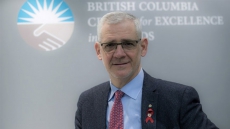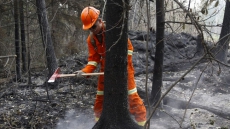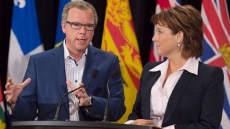OTTAWA — Most of what is billed as the largest, one-time benefit payment in federal history is likely to hit suburban voters living in federal ridings where the Conservatives can be considered the party to beat, an analysis by The Canadian Press shows.
Number-crunching based on the last census shows that many of the ridings in line to get the biggest cheques from the newly increased Universal Child Care Benefit are in suburban Alberta and the all-important ridings that surround Toronto — and they usually have a history of tilting Tory.
Only two of the top 20 destinations for the enriched UCCB payments landing on July 20 are locations where the opposition NDP would be considered the favourite; and one more in the top 20 would be considered a Liberal seat.
That leaves 17 seats that could be considered Conservative-leaning, home to the voters who could receive the biggest financial windfall when almost $3 billion in child care benefit payments are mailed on Monday — three months before election day in October.
The majority of spending continues to go to Conservative ridings — 15 of the top 20 — even after adjusting the payments to take into account the estimated percentage of families who haven't signed up for the enhanced benefit.
Opposition parties have criticized the government for giving out the increased benefit payment, backdated to the start of the year, as an election ploy to buy votes.
But all three main parties have released platform planks designed to woo families who tend to concentrate in the key suburban ridings that could swing the federal election.
"The demographic that (parties) are all fighting for are the parents, the kids, the families that are just starting out. So this is why this puts (child care) up on the agenda," said Kathy Brock, an expert on party politics from Queen's University in Kingston, Ont.
Since 2006, the government has handed out monthly payments of $100 for every child in Canada under age six. That changes on Monday as the payment rise to $160 a month, and children age six to 17 earn their parents $60 per month.
The increased payments are retroactive to the start of the year, meaning the payments this month will be higher than any before: up to $520 for children under six, and up to $420 for every child six to 17.
The government doesn't decide where in the country the money will go; it does get to decide who should receive the money.
To get a more detailed picture of where those families live, The Canadian Press used census data from Statistics Canada to plot the location of children under age 18 in each of Canada's 338 ridings, and then calculated how much each riding would receive in new monthly child care benefit spending.
The totals were also adjusted to reflect the percentage of families in each province who have not signed up for the benefit to see if there was any marked differences in outcomes, which there was not.
The analysis then used an Elections Canada study that transposed the outcome in each of those 338 ridings based on the poll-by-poll breakdown of votes from the 2011 campaign. (In 2011, there were just 308 ridings, so Elections Canada has done number-crunching to figure out who would have won if the 338 ridings had exited in 2011.)
The census figures are four years old, meaning the number of children in each age group has likely changed as children grow up, babies are born, and families move around the country.
The analysis showed that the highest grossing ridings are most likely to be in the 905-belt around Toronto, as well as the suburban areas of Calgary that supported the Conservatives in 2011.
In an interview, Employment Minister Pierre Poilievre, who oversees the expanded child benefit, offered a simple explanation.
"Families have supported the Conservative party because the Conservative government has supported families," Poilievre said.
"It's no coincidence that many families live in ridings that have elected Conservative MPs."
The Toronto-area 905 ridings in Mississauga and Brampton remain a key battleground for all parties heading into the 2015 vote: The Conservatives want to maintain their support, the Liberals are looking to regain votes they lost, and the NDP want to expand support in the suburbs beyond the downtown Toronto ridings where they have traditionally done well, said Jack Mintz from the University of Calgary.
Experts also suggest that the payments could attract two demographics the Conservative have to influence if they want to expand their base of support: immigrant communities and mothers, Brock said.
Add to that the feeling from families that their finances are being strained by rising costs for goods, services and utilities, and there's a fine line between the parties are being opportunistic and simply trying to respond to voters' needs, Brock said.
"We can be cynical about it, but on the other hand this is also democratic responsiveness," she said.
The NDP want to keep the universal child care benefit, but eventually spend $5 billion a year for a universal daycare system. The Liberals want to replace the child care benefit with a larger income-tested benefit payment that would require a Justin Trudeau to find $2 billion to make it happen.
Poilievre argued the difference between the difference between his party and the opposition was "credibility": "We offer proven results that people can see in their mailbox and in their bank account — on Monday."
The Bank of Canada predicts that families will save about half the $2.98 billion, socking some of it away in registered education savings plans. What families wind up spending will bump up consumption spending by about one per cent, the central bank said. And the spending may not be on daycare alone — something Poilievre recognizes.
"There are four million different families with four million different situations. So parents can spend it however they like," Poilievre said.
Here are the top 20 ridings likely to receive the most from increased benefits for children five and under

OTTAWA — The government is increasing the value of the monthly universal child care benefit (UCCB) starting Monday. Here are the top 20 ridings that are likely to receive the most money per month for children up to age five based on an analysis of census data by The Canadian Press. In brackets is the party that took the riding in 2011, or would have if the riding had existed then, according to Elections Canada:
Calgary Skyview (riding history: Conservative): $1,903,200
Churchill–Keewatinook Aski (NDP): $1,879,200
Calgary Shepard (Conservative): $1,762,400
Brampton West (Conservative): $1,730,400
Edmonton–Wetaskiwin (Conservative): $1,720,000
Peace River–Westlock (Conservative): $1,711,200
Grande Prairie–Mackenzie (Conservative): $1,710,400
Oakville North–Burlington (Conservative): $1,684,800
Milton (Conservative): $1,656,000
Calgary Rocky Ridge (Conservative): $1,633,600
Red Deer–Lacombe (Conservative): $1,620,000
Saint-Léonard–Saint-Michel (Liberal): $1,606,400
Bow River (Conservative): $1,574,400
Brampton East (NDP): $1,561,600
Fort McMurray–Cold Lake (Conservative): $1,518,400
Whitby (Conservative): $1,514,400
Mirabel (NDP): $1,496,000
Brantford–Brant (Conservative): $1,492,800
King–Vaughan (Conservative): $1,490,400
Etobicoke North (Liberal): $1,484,000



